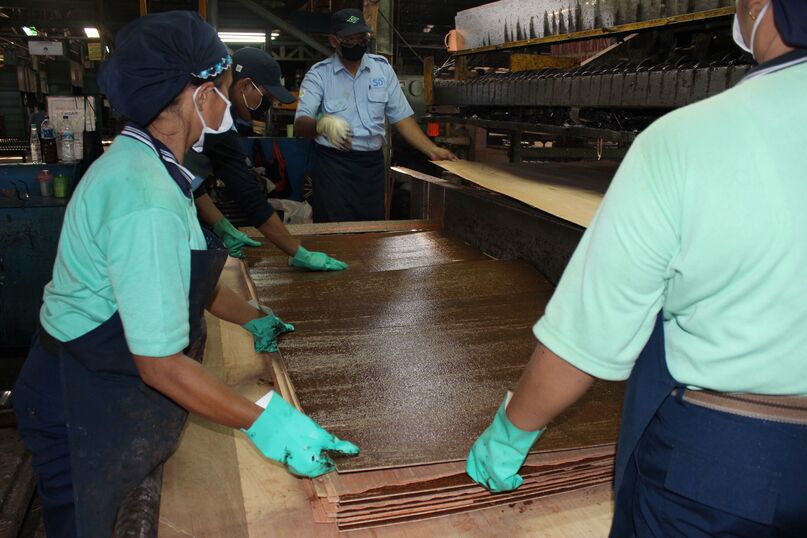ITTO Executive Director says legal, sustainable timber supply chains are key nature-based solutions
18 October 2023

A plywood veneer sheet factory in Indonesia. Sustainable forestry and legal and sustainable supply chains can help solve the global environmental crisis. Photo: MY Massijaya
18 October 2023: In a keynote address at the ANZIF Conference on 16 October, ITTO Executive Director Sheam Satkuru stressed the importance of legal and sustainable tropical timber supply chains and called for more investment in sustainable tropical forestry and forest enterprises to promote inclusive and resilient solutions for people and the environment in a more circular bioeconomy.
“Forests, especially tropical forests, sit in the eye of a global storm,” said Ms Satkuru. “There is an urgent need for concerted efforts to address the complex issues threatening these crucial ecosystems and using them sustainably is a huge part of an effective nature-based solution.”
The ANZIF Conference is a premier event for forestry professionals in Australia and New Zealand. The 2023 event held in Tweed Heads, Australia, has attracted nearly 450 forest scientists, professionals and growers on the theme, “Embracing our natural capital: The science, technology, and art of managing forests for all values”.
“Forests are vital for life on Earth,” Ms Satkuru told delegates in her video address and in later comments. “When managed sustainably, they conserve soil and water, filter air, prevent land degradation, and reduce the risk of natural disasters.”
Ms Satkuru said sustainable forestry can help solve the global environmental crisis. A crucial aspect was legal and sustainable timber supply chains, which is why this is a key programmatic line for ITTO.
“ITTO’s work in this area emphasizes the use of wood as the most cost-effective and environmentally friendly material,” she said.
Ms Satkuru presented examples illustrating the effectiveness of legal and sustainable tropical timber supply chains and other elements of ITTO’s work as potent nature-based solutions.
“ITTO projects have successfully established timber tracking systems in Cameroon, Ecuador, Guatemala, Panama, and the Philippines,” she said. “We have shown that it can be done in the tropics, and also that such systems improve efficiency across supply chains and combat illegal logging.”
Ms Satkuru said multistakeholder involvement and gender equality are other key ingredients of sustainable forestry.
“Empowering local communities—especially women—in decision-making and ensuring gender parity are essential for maximizing the social, environmental and economic benefits of sustainable forestry,” she said.
Ms Satkuru said that although sustainable tropical forestry contributes to almost all the Sustainable Development Goals, it is underfunded, both internationally and by national governments.
“More investment in sustainable tropical forestry is essential for promoting inclusive and resilient solutions,” she said.
After Ms Satkuru’s keynote address an interactive questions and answers session provided opportunities for further exchanges with the audience present at the event.